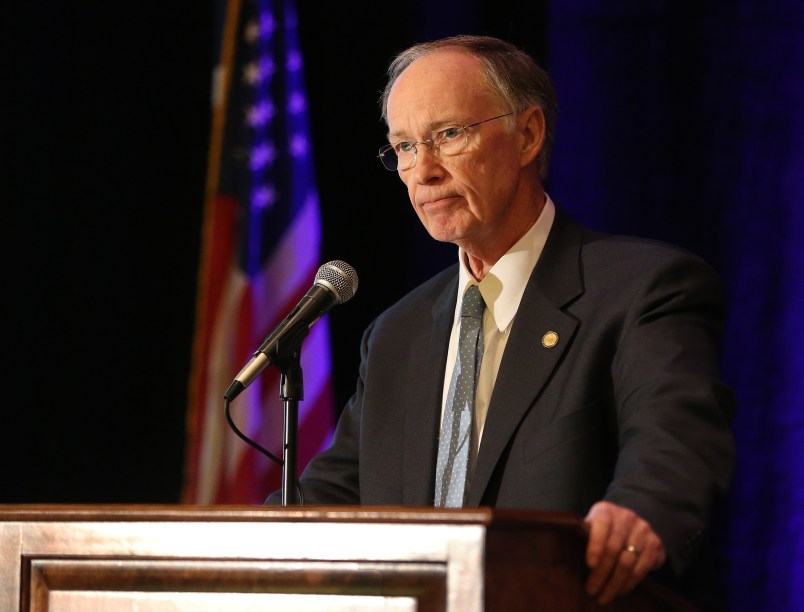MONTGOMERY, Ala. (AP) — Gay marriage arrived to parts of Alabama on Monday — but not to others — after the state’s chief justice sought to put the weddings on hold, echoing familiar southern refrains of resistance to the intrusion of federal courts.
Jubilant couples emerged with marriage licenses in hand from courthouses in Montgomery and Birmingham and other cities on the day a judge’s order went into effect overturning the state’s ban on gay marriage and makingAlabama the 37th state where gays can legally wed.
Other counties refused to issue licenses to gay couples, or closed marriage license operations entirely, following the advice of the state’s top jurist.
Chief Justice Roy Moore directed probate judges to refuse the licenses and resist what he called an “illegal” intrusion by the federal court. He said Alabama’s 68 probate judges were not bound by the decision since they were not defendants in the lawsuit brought by two women seeking recognition of their California marriage.
“It’s my duty to speak up when I see the jurisdiction of our courts being intruded by unlawful federal authority,” the 67-year-old Republican chief justice of Alabama’s Supreme Court said in an interview Monday.
The uneven marriage landscape left one thing a certainty Tuesday: The legal maneuvering over gay marriage would continue in the Deep South state.
At least six gay couples, who had hoped to marry on Monday filed federal lawsuits after Mobile County’s marriage license division never opened for business.
“Same-sex marriage is the law of the land. Roy Moore has tried to cloud the issue with his order to probate judges to try to lead them astray,” said David Kennedy, a lawyer representing the couples in one of the lawsuits.
U.S. District Judge Callie Granade last month ruled that the state’s gay-marriage ban was unconstitutional and — in a later clarifying order — said probate judges have a legal duty under the U.S. Constitution to issue the licenses. On Monday morning, the U.S. Supreme Court refused to block the start of gay marriages in Alabama.
Kelli and Lisa Day balanced toddlers on their hips after getting their marriage license in Montgomery. The couple have been together for more than 20 years and together have four children, ages 1 through 14. Kelli Day said she wasn’t sure this day would come in her lifetime.
“We just want to be legal. We already are committed and have a family. But if one of us dies, our children are not protected,” Kelli Day said.
Other counties refused to dispense such licenses or shut down their marriage license operations altogether, citing Moore’s directive or confusion about what the law required.
Russell County Probate Judge Alford Parden said his office had turned away at least one same-sex couple because of Moore’s order but was issuing licenses to heterosexual couples. He said he considered the letter from Moore, the state’s top judicial officer, a binding court order.
Parden said he felt caught between state and federal court orders. “I think every probate judge in the state feels that way. … It’s an unfortunate event for all of us.”
Moore’s talk of unlawful federal authority brought immediate comparisons to segregationist Gov. George Wallace.
“Moore is using the religion issue to further his political career, just as Wallace used the race issue to further his,” said Richard Cohen, president of the Southern Poverty Law Center, a major civil rights organization, that filed a judicial complaint against the chief justice, accusing him of trying to incite chaos at the probate courts.
Moore bristled at the comparisons to Wallace and of same-sex marriage as a civil rights issue.
“This is not about the right of people to be recognized with race or creed or color. This is about same-sex marriage. It is not the same subject,” he said.
Moore’s staff noted that Granade rejected a Monday afternoon request to sanction the Mobile County probate judge for not issuing marriage licenses Monday. The judge, Granade noted, was not a direct party in the case originally brought by couples seeking to have their out-of-state marriage recognized.
The well-worn path of defiance against the federal courts, and the imagery that invokes, is one the governor ofAlabama said he would rather not travel.
Gov. Robert Bentley, a Republican and a Southern Baptist, said he believes strongly that marriage is between one man and one woman, but that the issue should be “worked out through the proper legal channels” and not through defiance of the law.
The governor noted that Alabama is about to be in the spotlight again with the 50th anniversary of the Voting Rights Act of 1965, which was passed after civil rights marchers were attacked and beaten in Selma, Alabama — events chronicled in the Oscar-nominated movie “Selma.”
“I don’t want Alabama to be seen as it was 50 years ago when a federal law was defied. I’m not going to do that,” Bentley said in an exclusive interview with The Associated Press.
“I’m trying to move this state forward.”
___
Reeves reported from Birmingham, Alabama.
Copyright 2015 The Associated Press. All rights reserved. This material may not be published, broadcast, rewritten or redistributed.







"I’m trying to move this state forward."Leaving aside the sincereness of this statement, it’s quite clear the people of Alabama do not want to follow.
Sometimes regressives have to be dragged kicking and screaming into the present…
Seems to me more a case of certain “leaders” not wanting the people to follow because it undermines their moral authority, which diminishes every time a class of citizens has its officially sanctioned stigma lifted.
Politics aside, here’s to hoping Alabama truly does move forward (in the here and now, that is).
Shorter Bentley “We’re going to ‘walk in place’ like Marcel Marceau and sincerely hope nobody will call us out on it.”